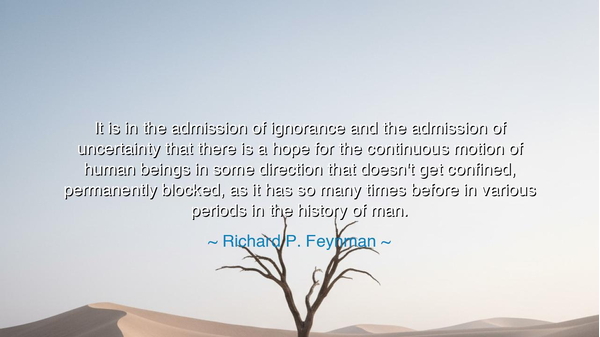
It is in the admission of ignorance and the admission of
It is in the admission of ignorance and the admission of uncertainty that there is a hope for the continuous motion of human beings in some direction that doesn't get confined, permanently blocked, as it has so many times before in various periods in the history of man.






“It is in the admission of ignorance and the admission of uncertainty that there is a hope for the continuous motion of human beings in some direction that doesn't get confined, permanently blocked, as it has so many times before in various periods in the history of man.” – Richard P. Feynman
Thus spoke Richard P. Feynman, the physicist of paradoxes and the poet of science, whose words shimmer with the clarity of reason and the humility of wisdom. In this saying, he unveils a truth that reaches beyond laboratories and equations — a truth about the soul of human progress. He teaches that it is not certainty, but the admission of ignorance, that sets mankind free. For when men believe they know all, their minds close; but when they confess that they do not, the door to discovery opens. In the fertile soil of uncertainty, curiosity grows, and through curiosity, humanity moves ever forward.
The origin of this wisdom lies deep in Feynman’s life as a scientist and thinker. He belonged to the brotherhood of seekers — those who dared to question even the most sacred truths. In an age of expanding knowledge, when the atom had been split and the stars measured, he reminded the world that the greatest danger was not ignorance itself, but the illusion of knowledge. “We are never sure,” he said elsewhere, “we only believe we are sure.” It was this reverence for doubt that made him both a revolutionary scientist and a philosopher of humility. For Feynman knew that once humanity claims absolute understanding, its progress halts — like a river dammed by arrogance.
History itself proves his words. There have been many ages when mankind’s spirit was confined, when certainty became a prison. In the Middle Ages, scholars believed that all wisdom had been written in sacred texts, that the heavens moved in perfect circles as Aristotle and Ptolemy had decreed. To question was heresy. Thus, for centuries, the light of inquiry dimmed, and civilization stood still. But then came Galileo, who dared to look through his telescope and say, “I see otherwise.” For that act of doubt, he was condemned — yet it was his admission of uncertainty that reignited the motion of human thought. His willingness to say “perhaps” in a world of “must be” birthed a new age: the Age of Reason.
Feynman’s words are an echo of this eternal cycle — the dance between knowledge and humility. Every time humanity grows certain, it begins to decay. The ancient empires fell not because their armies weakened, but because their minds did. The Romans believed their laws eternal; the Church believed its doctrine infallible; the Soviets believed their ideology perfect. In each case, the refusal to doubt sealed their fate. But wherever uncertainty has been embraced — in the spirit of exploration, in the quest for truth — there civilization has flourished. The voyage of Columbus, the theories of Einstein, the inventions of the digital age — all were born of minds unafraid to say, “We do not yet know.”
To admit ignorance, then, is not weakness, but strength. It is the mark of a civilization still alive. The scientist who says, “I do not know,” has already taken the first step toward discovery. The philosopher who questions his own wisdom becomes wise. Even the artist, who stands before a blank canvas, begins not with certainty, but with wonder. In uncertainty, there is motion — and motion is life. When we cling too tightly to what we think we know, we stagnate; when we release our grip, we evolve. Feynman’s insight is thus both scientific and spiritual: only by embracing the unknown can humanity escape its self-made cages.
And yet, his message is also a warning. For as he says, history is filled with moments when the motion of mankind was blocked — when pride, ideology, or fear halted the forward flow of thought. Each generation believes it stands at the pinnacle of understanding, but the wise know better. They see that truth is not a fortress, but a horizon — always beyond reach, always calling us onward. The hope of humanity lies not in being right, but in being willing to learn anew, again and again.
So, my child of the future, take this lesson into your heart: cherish uncertainty, for it is the seed of wisdom. Do not fear to say, “I do not know,” for those words are the beginning of every great discovery. When others boast of certainty, be the one who asks questions. When the world declares itself complete, be the voice that whispers, “There is more.” For as Feynman reminds us, it is only through the humble acceptance of ignorance that we keep our world in motion — that we continue to climb, not toward perfection, but toward understanding. And in that endless journey lies the glory and the salvation of mankind.






AAdministratorAdministrator
Welcome, honored guests. Please leave a comment, we will respond soon